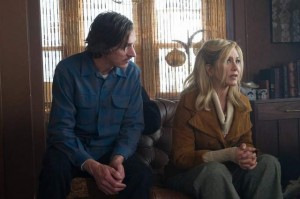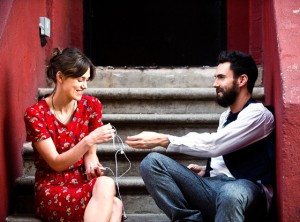RICHARD’S REVIEWS FOR AUG 22, 2014 W “CANADA AM” HOST BEVERLY THOMSON.
 “Canada AM’s” film critic Richard Crouse shares his reviews for ‘The November Man,’ ‘Life of Crime,’ ‘The Calling,’ and ‘As Above, So Below.’
“Canada AM’s” film critic Richard Crouse shares his reviews for ‘The November Man,’ ‘Life of Crime,’ ‘The Calling,’ and ‘As Above, So Below.’
Watch the whole thing HERE!
 “Canada AM’s” film critic Richard Crouse shares his reviews for ‘The November Man,’ ‘Life of Crime,’ ‘The Calling,’ and ‘As Above, So Below.’
“Canada AM’s” film critic Richard Crouse shares his reviews for ‘The November Man,’ ‘Life of Crime,’ ‘The Calling,’ and ‘As Above, So Below.’
Watch the whole thing HERE!
 “Life of Crime” is slickly made but blandish adaptation of Elmore Leonard’s novel “The Switch.” As usual Leonard’s bad guys are more interesting than the straights. The trick here is figuring out who the bad guys are.
“Life of Crime” is slickly made but blandish adaptation of Elmore Leonard’s novel “The Switch.” As usual Leonard’s bad guys are more interesting than the straights. The trick here is figuring out who the bad guys are.
Jennifer Aniston is Mickey, the trophy wife of the abusive and corrupt Frank Dawson. Outwardly they have the perfect marriage, but at home trouble is brewing. At home, at least when Frank isn’t off doing “business” at his hideaway in the Bahamas, tending to his girlfriend Melanie (Isla Fisher) and off shore bank accounts.
When two low-rent criminals, Louis (John Hawkes) and Ordell (Yasiin Bey, the artist formerly known as Mos Def) kidnap Mickey they hadn’t counted on Frank using their plan as a quickie divorce. No ransom, no alimony. Cue the double crosses and intrigue.
The major selling point here is the dialogue. Leonard was a master of the backroom criminal dialogue and here they have the good sense to keep most of his snappy words intact. Hawkes and Bey are particularly adept at delivering the goods, mouthing the words as if they were Leonard’s illegitimate children. Robbins is convincing as the sleazy land developer and Fisher is a femme fatale in the making. The weak link is Aniston, who seems like she might have calibrated her performance for the similarly plotted “Ruthless People” rather than a down-and-dirty crime drama.
Like many of Leonard’s stories “Life of Crime” tends to favor the characters who live on the down low. Hawkes and Bey—despite their association with a neo-Nazi (Mark Boone Jr.)—are treated as the sensitive heroes of the piece, while everyone else is playing some sort of game. It makes for interesting character dynamics but doesn’t sit as well here as it did in “Get Shorty” or “Out of Sight.”
 Near the end of “Begin Again,” the new musical romance from “Once” director John Carney, record producer Dan (Mark Ruffalo) instructs a guitar player, who is also his daughter (Hailee Steinfeld), to “keep it simple.” It seems director Carney took the advice as well, using the KISS principle—Keep It Simple Stupid—in the telling of this uncluttered story of redemption and pop songs.
Near the end of “Begin Again,” the new musical romance from “Once” director John Carney, record producer Dan (Mark Ruffalo) instructs a guitar player, who is also his daughter (Hailee Steinfeld), to “keep it simple.” It seems director Carney took the advice as well, using the KISS principle—Keep It Simple Stupid—in the telling of this uncluttered story of redemption and pop songs.
When we first meet Dan he’s having a bad day. His estranged daughter is mouthing off to him, he gets fired from the label he helped create and even his car breaks down. The day—by this time it’s night, actually—improves when he stumbles into a bar to drink his blues away and hears Gretta (Keira Knightley) singing a sad song from the stage. In his mind’s eye he hears a hit, a song that could make her a star and give him another shot at relevancy.
Before he can begin again, however, he must help Gretta get over her ex-boyfriend, up-and-coming rock star Dave Kohl (Adam Levine)—he’s the kind of guy whose voicemail says, “It’s Dave. I’m probably doing something awesome so I won’t get back to you… ever.”—and her distrust of the trappings of fame.
“Begin Again” is as much about the love of music and it’s ability to heal as it is about the various relationships it essays. Carney is covering familiar ground here. His film “Once” breathed the same air, but it’s rarefied air, and he pulls it off with panache.
For instance, Gretta and Dan bond over a shared iPod filled with their favorite songs. Taken by the music they have a “we have to dance right now” moment, but it’s done with a twist when they go to a club and dance to their own music courtesy of their iPod earphones while everyone around them literally dances to the beat of a different drummer.
Ruffalo brings considerable passion to the role of Dan, an “I’ve-been-down-so-long it’s-looking-up-to-me” kind of guy. He’s a walking cliché, a record man who got eaten up by the business and a rough personal life, but Ruffalo gives him a soulfulness that’s very winning.
Knightley looks like an undiscovered indie darling, bringing a delicate but steely sensibility to her performance and the songs that help tell the story.
“The Voice” alum Levine and CeeLo Green (as a successful musician who owes Dan a favor or two) lend some music industry cred to their roles, but the heavy lifting, acting wise, is done by Ruffalo and Knightley.
“Begin Again” is a self contained story with a beginning, middle and satisfying end, but sets itself up for a sequel in the subtlest of ways. Dan comes up with the usual idea of recording Gretta’s album outdoors to get a real taste of New York in the grooves. After successfully setting up under the Brooklyn Bridge and in Central Park, Gretta suggests they could expand their horizons and make records on the streets of several other European cities. I’m not sure if that’s enough to build a franchise around, but I’d sure like to spend some more time with these characters.
 Michel Gondry, the French director best known for fanciful films like Eternal Sunshine of the Spotless Mind and eye-popping videos for Bjork, Massive Attack and The Chemical Brothers has, with Be Kind Rewind, made his most conventional movie to date. That’s not to say his sense of whimsy has disappeared—any film that recreates Fats Waller’s life using human hands for piano keys (more on that later) isn’t exactly blockbuster material—but the storyline seems more rooted in reality and not so much in dreamland this time around.
Michel Gondry, the French director best known for fanciful films like Eternal Sunshine of the Spotless Mind and eye-popping videos for Bjork, Massive Attack and The Chemical Brothers has, with Be Kind Rewind, made his most conventional movie to date. That’s not to say his sense of whimsy has disappeared—any film that recreates Fats Waller’s life using human hands for piano keys (more on that later) isn’t exactly blockbuster material—but the storyline seems more rooted in reality and not so much in dreamland this time around.
Passaic, New Jersey video store clerk Mike (Mos Def) and bumbling junk dealer Jerry (Jack Black) are longtime friends. Jerry jeopardizes Mike’s job and the future of the shop when he accidentally becomes magnetized (!) and erases the store’s entire inventory of VHS tapes. To prevent their most loyal customer, Ms. Kimberley (Mia Farrow), from telling the store’s owner, Mr. Fletcher (Danny Glover) that the store’s entire stock is worthless, they decide to make their own versions of the store’s most popular titles.
Armed with an ancient looking video camera and homemade props they re-create or “Swede”—Jerry nonsensically tells a customer the tapes are imported from Sweden—a number of well-known films including The Lion King, Rush Hour, Ghostbusters, Back to the Future, Driving Miss Daisy, Robocop and, my favorite, When We Were Kings and in the process become local heroes. The tapes become so popular they attract unwanted attention from a Hollywood studio who accuses the pair of illegally bootlegging the movies. Faced with bankruptcy and the loss of their beloved store, the duo makes one last film. With the help of the entire community they produce an epic biography of Mike’s hero, Fats Waller.
Gondry’s signature style is all over Be Kind Rewind. The film is a treasure chest of inventive visuals from the strange piano with white and black fingers substituting for keys—even Salvador Dali would be knocked back by that image—to a breathtaking real time montage of the best bits of their homemade movies. Gondry’s work here, as always, is a treat for the eyes. Luckily the film’s visual inventiveness makes up for the lapses in the story.
I love the ideas at play here—that film can be a unifying, communal art form which bridges race, religion and can even soften the hearts of bureaucrats (see the film’s final two minutes) that a movie with heart trumps Michael Bay’s expensive bombast every time. I love all that, sentimental as it may be, it really plays to my inner film geek, but Be Kind Rewind’s Achilles heel is the difficulty Gondry has in switching from the magic realism of the piece back into the more earthbound aspects of the story. Still, despite the awkward storytelling the movie has a gentle, heartfelt vibe that is hard to resist, particularly if you’re a movie fan.